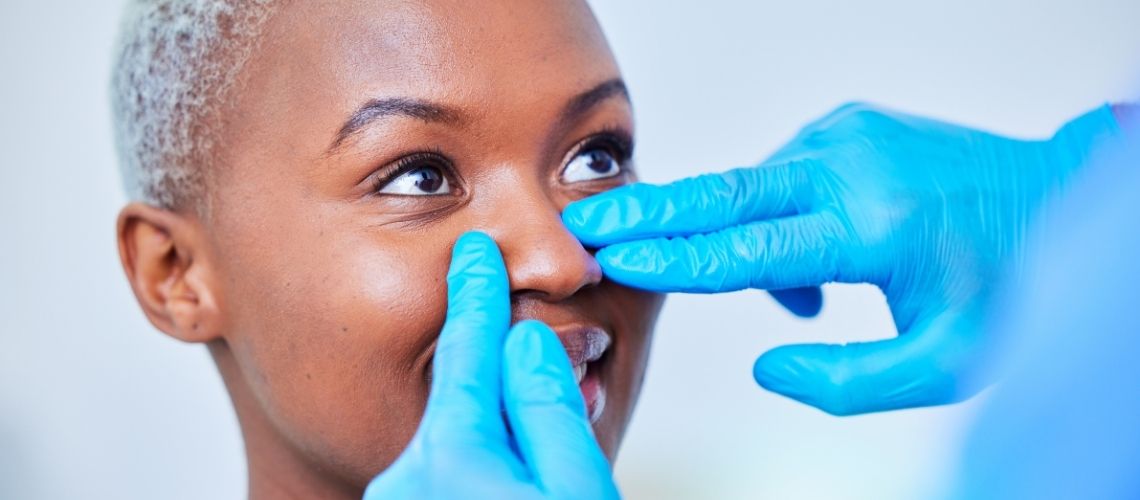Undergoing revision rhinoplasty involves a recovery process distinct from the initial surgery. Initially, one may notice some common postoperative symptoms. These include swelling and bruising around the nasal area, along with a general sense of discomfort. Moreover, a feeling of nasal congestion is typical. It is crucial to keep the nasal cast dry throughout the recovery period. Additionally, maintaining an elevated head position during sleep aids in reducing swelling. Rino Body is a medical pillow designed to provide you with a comfortable and safe sleep. Benefits of this pillows:
- Keeps your head steady during sleeping
- Increases sleep comfort.
- Protects your nose from unwanted impacts during sleep after rhinoplasty surgery
Furthermore, patients are advised to refrain from wearing glasses to avoid pressure on the nose. Also, to prevent complications, it is essential to avoid blowing the nose during recovery.
Table of Content
Understanding Post-Operative Swelling in Revision Rhinoplasty
Swelling is a natural response of the body to any surgical procedure, and revision rhinoplasty is no exception. Due to the delicate nature of facial tissues, swelling is more noticeable in this region. This can temporarily alter the appearance of facial features, making them seem distorted. To manage this, doctors typically prescribe medications aimed at reducing swelling effectively. Additionally, patients are encouraged to follow two key practices:
- Ensure consistent hydration, which plays a vital role in recovery.
- Keep the head elevated, especially while sleeping, to mitigate swelling.
Typically, swelling reaches its peak around the second or third day post-surgery. Interestingly, mornings often show more pronounced swelling, underscoring the importance of keeping the head elevated. Swelling is not a sign of complications. It is simply a part of the healing process. Over time, as the swelling subsides, the facial features gradually return to their normal state, revealing the true results of the surgery.
Managing Facial Discoloration Post-Surgery
Following a revision rhinoplasty, patients often experience varying degrees of bruising around the eyes and face. Initially, this discoloration may seem mild, but it can intensify after discharge from the medical facility. Typically, this bruising fades within a week, gradually diminishing in severity. There are instances where individuals notice their bruising lingering for several weeks. To alleviate this discoloration effectively, patients are advised to adopt certain measures:
- Elevating the head during sleep to reduce swelling and subsequent discoloration.
- Applying cold compresses in the initial days post-surgery, adhering to the surgeon’s guidelines.
- Avoiding high-intensity exercises and activities that may exacerbate swelling and bruising.
Furthermore, once the splint is removed, cosmetic solutions such as makeup can be employed to skillfully conceal any residual discoloration. It is crucial to understand that each individual’s recovery process is unique, and these guidelines serve to assist in navigating the healing journey more comfortably.
Managing Potential Hemorrhage Risks in Revision Rhinoplasty
Experiencing a hemorrhage during the recovery phase of a revision rhinoplasty can be concerning; however, it is manageable with the right approach. Initially, it is crucial to maintain a calm attitude. Stress or excitement might exacerbate the situation, leading to increased blood pressure. Therefore, remaining calm is key. Additionally, adopting a specific resting position can significantly aid in managing this complication. Lying down with the head elevated, either on pillows (Rino Body) or in a recliner, helps in reducing the blood flow to the nasal area. This position should be maintained to minimize the risk of further bleeding.
In the event of pain, which is a common occurrence post-surgery, it is advisable to take prescribed pain medication. This step is vital as it not only alleviates discomfort but also prevents an increase in blood pressure due to pain. However, it is essential to adhere strictly to the medication regimen recommended by the healthcare provider.
Regarding medication, certain types should be avoided:
- Aspirin
- Ibuprofen (Advil®)
- Other blood thinning medications
These medications can aggravate bleeding and should be eschewed. Instead, follow the specific guidance provided by the medical team regarding safe pain management. Adhering to these guidelines ensures a smoother recovery and mitigates the risks associated with hemorrhage after a revision rhinoplasty.
Pain After Nose Surgery
Individual responses to pain vary significantly, a fact that holds true in the context of revision rhinoplasty recovery. Typically, patients report experiencing only mild discomfort following this procedure. The sensation of pain often presents more like a bruised feeling. This discomfort is primarily due to swelling that is a natural consequence of the surgery.
To effectively manage this post-operative pain, the following steps are recommended:
- Adhere to pain management guidelines provided by the surgeon.
- Use prescribed pain relievers, ensuring they do not have blood-thinning properties such as acetaminophen.
- Apply cold compresses gently around the nasal area to reduce swelling.
Furthermore, engaging in relaxing activities and ensuring a peaceful environment can significantly contribute to pain reduction. It is also crucial to maintain regular follow-ups with the surgeon. These visits allow for monitoring the healing process and adjusting pain management strategies as needed. By taking these measures, patients can navigate their post-surgery period with minimal discomfort and ensure a smoother recovery process.

1976 yılında İzmir’de doğan Prof. Dr. Murat Songu, İzmir Atatürk Lisesi sonrası 1994 yılında Ege Üniversitesi Tıp Fakültesi’ne girdi. Kulak Burun Boğaz Hastalıkları uzmanlık eğitimini Celal Bayar Üniversitesi’nde tamamladı. 5 Eylül 2014 tarihinde Ankara Dışkapı Yıldırım Beyazıt Hastanesi’nde yapılan sözlü sınavı ile “Kulak Burun Boğaz Hastalıkları Doçenti” olmaya hak kazandı. Türk Kulak Burun Boğaz ve Baş Boyun Cerrahisi Derneği Bursu’nu kazanarak Şubat 2016 – Mayıs 2016 tarihleri arasında Amerika’da Pittsburgh şehrinde UPMC (University of Pittsburgh Medical Center)’da Robotik Cerrahi Ünitesi’nde çalıştı. 2 Nisan 2021 tarihinde “Kulak Burun Boğaz Hastalıkları Profesörü” olmaya hak kazandı. Evli ve iki çocuk (Ayşe Songu, Selim Songu) babasıdır.




